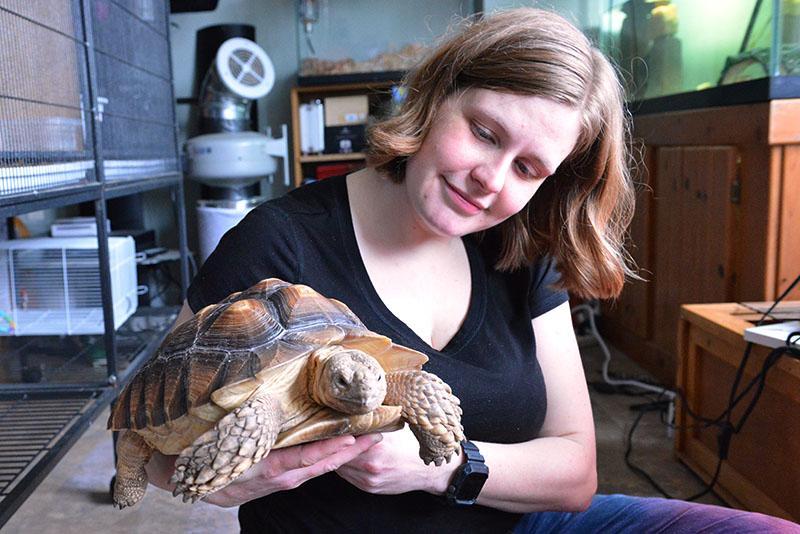2017-2018 | What is the Caloric Cost of the Rat Line?
If It Slithers or Swims … She’ll Take It In

Lt. Col. Emily Lilly spends some time with a tortoise in her care.—VMI Photo by Mary Price.
LEXINGTON, Va., May 2, 2018—Lt. Col. Emily Lilly just might run one of the quietest animal rescue operations in the state.
Step into her Fairfield home, and the sound that will greet a visitor is silence. At first glance, nothing seems unusual—until a look around the living room reveals a plethora of aquarium tanks everywhere, each with a cold-blooded occupant.
It’s the same situation in the basement and upstairs at her house, where bearded dragons, ball pythons, monitors, red-eared painted turtles, and dozens more species can be found at every turn. Welcome to Blue Ridge Reptile Rescue, the only licensed nonprofit organization in the commonwealth that’s dedicated solely to reptiles.
Like most people who run rescue operations, Lilly, associate professor of biology, started small.
“It started accidentally,” she remarked, explaining that she began with a bearded dragon named Annie who’d been thrown away with her tank. “She was in horrible shape, and she was so skinny. It was really rewarding to watch her get healthy again and to know that I could do something to change an animal’s life like that.”
Then, more and more found their way to her doorstep. Now, she really doesn’t know how many she has at any given time—the only number that she can give is dozens. “I usually don’t keep score, but it’s usually between 60 and 100,” she said. Thankfully, animals are adopted on a regular basis: last year, 60 reptiles found new owners.
Coming in the door, many animals are in rough shape, some from abuse and others from lack of knowledge on the part of novice reptile owners. Once, a six-foot boa constrictor was found in the Dumpster by sanitation workers in Alexandria, Virginia. “They brought me that one,” Lilly stated. “She had been severely abused. Nearly all of her ribs had been broken.”
Under Lilly’s watchful care, the snake regained her health—and found a new home with a family that has a custom-built enclosure just for her. “They adore her and baby her. She finally has the life she was meant to have,” said Lilly.
Another animal, a bearded dragon currently in Lilly’s care, has a severe case of rickets, a bone-weakening disease caused by vitamin D deficiency, because the former owner was unaware that reptiles need a source of UVB light so their bodies can manufacture vitamin D.
“A lot of times people will get an animal with good intentions, but they fail for a lack of education,” said Lilly. “I spend a lot of time on education.”
Determining if a potential adopter can provide a good home is crucial. Often, Lilly winds up educating a first-time reptile owner, and the animal thrives in its new environment. Other times, Lilly will hear something along the lines of, “I want a cheap pet, and one that I won’t ever have to take to the vet.” If that happens, “I usually offer them a rock,” she commented.
Lilly is adamant about saving as many reptiles as she can—even when that means space for reptiles taking a precedence over space for humans at her house.
“We are no kill, in the sense that no animal is euthanized for lack of space,” she explained. As you can see, they just move into the kitchen. I don’t ever turn an animal away for lack of space. Unfortunately, we do get animals that are too sick to save.”
Thankfully, Lilly has enough veterinary knowledge, especially when it comes to nutritional therapy, to do a good bit of animal doctoring herself. A trained microbiologist, she also uses a microscope to examine fecal samples for parasites so she can treat infestations appropriately. Surgical care, though, is beyond her scope of training, so she relies on veterinarians in Waynesboro and Roanoke when needed.
Funding for the rescue comes from donations—sometimes from the thankful owners of rescued animals who are being freed of a burden, and sometimes from businesses. A local restaurant, for example, gives Lilly its old lettuce and other salad greens so she can make what she calls “herbivore salad,” enriched with vitamins and calcium powder, for the animals in her care. Another business, a pet store, donates its expired foods and supplements rather than throwing them away.
But with the sheer number of mouths, even small ones, to feed in Lilly’s house, there’s a good bit of grow-your-own in the food department. Lilly raises cockroaches, which she calls “lizard candy,” and she also keeps chickens because corn snakes love eggs, and other animals like omelets. This do-it-yourself approach is not only cheaper, she noted, but also healthier.
“Food is expensive,” said Lilly matter-of-factly. “Fresh food is more nutritious for them.”
When she’s not rescuing reptiles, Lilly stays busy with a full teaching load at VMI, plus tending to the needs of her two daughters and making time for her own hobby—karate, a sport in which she recently earned her third degree black belt. There’s not much time to rest—but Lilly doesn’t seem to mind.
“I love what I’m doing, and that makes it easier.”
-Mary Price
-VMI-
.svg)
.png)